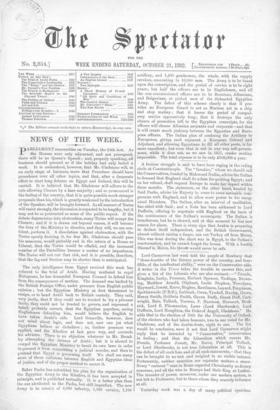Lord Carnarvon last week told the people of Newbury that
"three-fourths of tile literary power of the country, and four. fifths of the intellectual ability," were on the Conservative side. A writer in the Tiniest takes the trouble to answer this, and gives a list of the Liberals who are also eminent :—" Fronde, Kinglake, Lecky, Freeman, Herbert Spencer, Trollope, Brown- ing, Matthew Arnold, Oliphant, Leslie Stephen, Trevelyan, Hayward, Jowett, Reeve, Hughes, Rawlinson, Layard, Fergnsson, Spottiswoode (P.B.S.), Lubbock, Owen, Tyndall, Huxley, Grove, Henry Smith, Goldwin Smith, Gavan Duffy, Grant Duff, Cart- wright, Bain, Tulloch, Torrens, F. Harrison, Harcourt, Broil- rick, Lord E. Fitzmaurice, Lowe (Lord Sherbrooke), Lord Dufferin, Lord Houghton, the Duke of Argyll, Gladstone." He adds that in the election of 1805 for the University of Oxford, of the electors who had taken honours, two to one voted for Mr. Gladstone, and of the double-firsts, eight to one. The list would be conclusive, were it not that Lord Ce,rnarvon might reply that he intended by " Conservative," conservative in feeling ; and that the Liberalism which counts Mr. Fronde, Professor jowett, Mr. Reeve, Principal Tulloeli, or Lord Sherbrooke, is not true Liberalism at all. This is the defect of all such lists and of all such statements,—that they can be brought to no test and weighed in no visible balance. Fortunately, neither assertion nor rejoinder matters a straw. Every " eminent " man in Rome regarded Christianity as dreary nonsense, and all the wise in Europe had their fling at Luther. The transfer of power, moreover, under our modern system, is not left to Professors, but to those whom they scarcely influence at all.


































